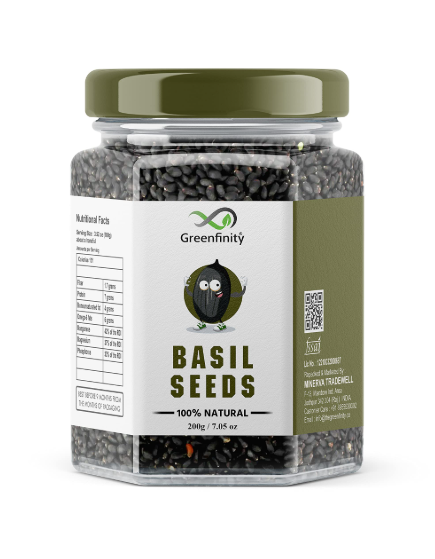Cholesterol is essential for the human body as it plays several important roles, including maintaining the flexibility of cell walls and helping to produce various hormones. However, when present in excess, cholesterol can lead to serious health issues. Since cholesterol does not dissolve in water, lipoproteins are necessary to transport it along with fat-soluble vitamins in the bloodstream. In this article, we will explore how Sabja seeds can help lower cholesterol levels and improve heart health.
Excessive cholesterol, particularly the type carried by low-density lipoproteins (LDL), can build up on the walls of blood vessels. This accumulation can lead to narrowed arteries, increasing the risk of heart attacks, strokes, and kidney failure. On the other hand, high-density lipoproteins (HDL) help prevent cholesterol from settling in the arteries by carrying it away from blood vessels. There are many natural methods to boost HDL cholesterol in the body, and one of them includes incorporating Sabja seeds into your diet.
What Are Sabja Seeds?
Sabja seeds, also known as basil seeds, falooda seeds, or tukmaria seeds, are small, black seeds derived from the sweet basil plant (Ocimum basilicum). While similar in appearance to sesame seeds, Sabja seeds are packed with beneficial nutrients and immune-boosting properties. Native to India, these seeds have been used in both Ayurvedic and Chinese medicine for centuries. They are particularly known for their ability to regulate blood sugar, enhance metabolism, reduce inflammation, and lower cholesterol.
How Sabja Seeds Help Lower Cholesterol
One of the key components of Sabja seeds that aids in lowering cholesterol is soluble fiber. Soluble fiber dissolves in water and is not digested by the human body, but it is broken down by probiotics (beneficial bacteria) in the gut. These bacteria help reduce harmful lipoproteins like LDL and very-low-density lipoproteins (VLDL). According to a study published by the National Library of Medicine, consuming 3 grams of soluble fiber daily for several months resulted in an 18% reduction in LDL cholesterol.
The soluble fiber found in Sabja seeds, particularly pectin, binds to cholesterol in the digestive tract, preventing its absorption into the bloodstream. This process helps lower cholesterol levels in the body and reduces the risk of heart disease by preventing cholesterol from building up in the arteries.
How to Use Sabja Seeds
Sabja seeds are readily available in Asian grocery stores or online. When purchasing, be sure to look for seeds labeled as “edible basil seeds,” as those intended for planting may be treated with pesticides and are more expensive.
To use Sabja seeds, they must be soaked before consumption. For every tablespoon of seeds, add one cup of water. If you prefer a larger quantity, you can use more water, but ensure the seeds are properly soaked to prevent clumping. Let the seeds soak for at least 15 minutes, during which time they will expand and form a gel-like coating, turning grey. Once soaked, you can add the seeds to a variety of recipes.
These seeds are versatile and can be added to smoothies, milkshakes, salads, puddings, oatmeal, muffins, and even bread. They can also serve as a replacement for eggs in baking by grinding them and using them in place of flour, making your baked goods healthier.
Precautions to Keep in Mind
While Sabja seeds offer numerous health benefits, there are a few precautions to consider:
- These seeds can elevate estrogen levels in the body, so pregnant women should consult with a doctor before consuming them.
- Small children may choke on the seeds if they are not properly soaked.
- Sabja seeds have anticoagulant properties, which means they may reduce blood clotting. Avoid consuming them at least two weeks before any surgery.
- Some potential side effects of Sabja seeds include diarrhea, nausea, loss of appetite, headaches, and vomiting.
Aside from lowering cholesterol, Sabja seeds offer a range of other health benefits. They help regulate blood sugar levels, relieve constipation, reduce stress and anxiety, and may even lower the risk of heart disease.
If you’re concerned about high cholesterol, consider speaking with your healthcare provider about incorporating Sabja seeds into your diet to enjoy their heart-healthy benefits.

发表回复